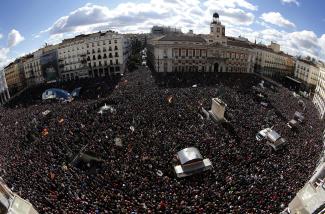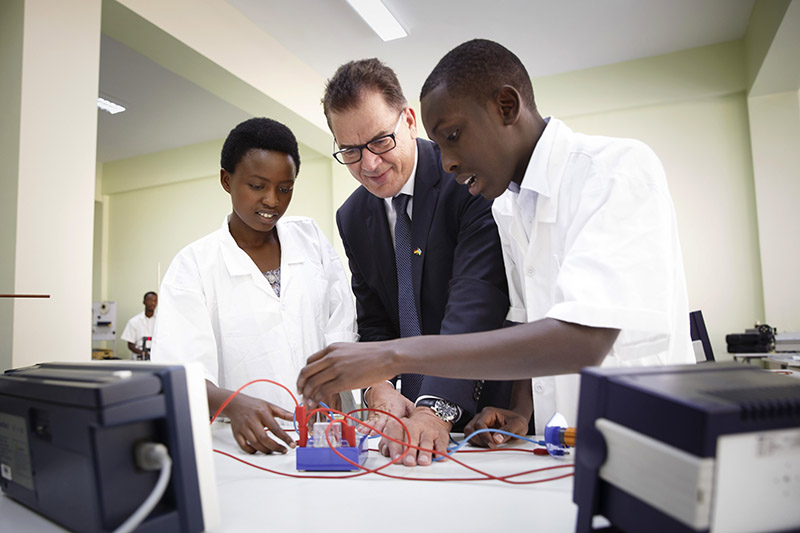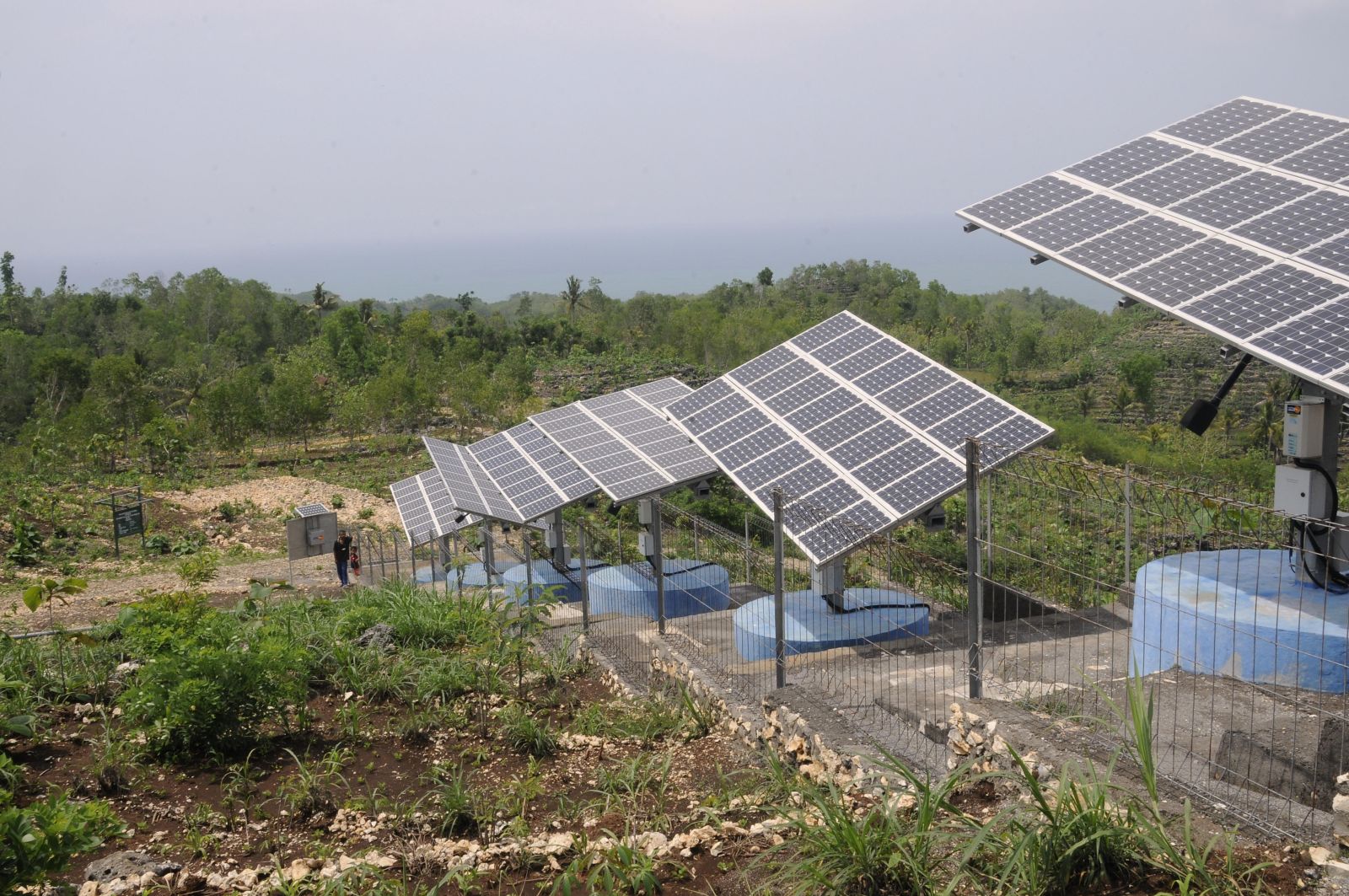European policy
“We must take seriously our own promises”

Initially, European unification was about building peace. The core members of the EU are France, Germany, the Netherlands, Belgium, Luxembourg and Italy. They pooled their policies on steel and coal, so no partner would be able to make weapons without the others noticing. Their community later proved to be very successful in economic terms, and the EU now has 28 members. Does the peace motive still matter?
Yes, it certainly does, and I would actually say that the accession of Eastern European countries was the greatest peace-building success to date. After the collapse of the Soviet Union, Europe only saw warfare in Yugoslavia, a country that did not even belong to the Warsaw Pact. This mostly peaceful course of events was certainly not to be taken for granted. Accession to the EU looked attractive to an overwhelming majority of the people concerned, so it was possible to create a new order without shedding blood.
But more recently the EU’s neighbourhood policy, which is meant to safeguard peace and improve standards of life, has contributed to the dangerous crisis in Ukraine.
Unfortunately, important players in the EU underestimated the Moscow’s sense of suffering humiliation. President Vladimir Putin considers his country a globally relevant power, not some kind of regional one. His radical nationalism is quite common in Russia. In response, the EU must make international law the guiding principle of all policy-making. Some western self-criticism is needed too. After all, George W. Bush’s Iraq war did not conform with international law.
Do people in developing countries still find western democracy attractive, or is there a new leaning towards authoritarian rule? People might hope for fast economic growth like in China.
Well, there are two sides to your question:
- In Asia, Africa and Latin America, civil society is evidently growing, and people want a say in public matters. The number of those who belong to the middle classes that have an annual purchasing power equivalent to $ 4000 to $ 40,000 has doubled to 2,5 billion since 1990. It will double once more by 2030. These are the people who are interested in getting information without restriction, expressing their views freely and making use of the freedoms of association and assembly. Those who live at subsistence level, however, are struggling for survival and cannot play a strong role in public affairs.
- At the same time, the west is currently in bad shape. Social exclusion has increased in Europe. In some EU countries, half of the young generation is unemployed, and that is not compatible with democracy in the long run. A lively debate concerning inequality has started in the USA. People worry that the influence of the moneyed elite is undermining democracy. Europe, on the other hand, has democracy deficits too. For instance, many citizens do not understand how EU policy is made and how decisions are taken. In view of the global financial crisis, which emerged in western countries, moreover, many doubt that the democracies are still capable of decisive action and of governing economic globalisation. The west must shore up its attractiveness. Otherwise, it will prove impossible to promote democracy in developing countries and emerging markets.
In what sense is the EU a global actor?
The EU is a strong player in trade affairs, a field in which it has the mandate to represent all members internationally. The EU is also a strong player in climate affairs, though its influence has recently been declining a bit. The EU is not a relevant player in global security matters, and in view of current crises, it is not a strong player in global economic affairs either. The EU plays potentially strong roles in global development as well as in ending violent conflicts and in post-conflict reconstruction.
Do current approaches to trade policy really boost the west’s attractiveness? The talks concerning TTIP, the Transatlantic Trade and Investment Partnership, seem to prove the shared interest of the EU and the USA in pursuing their own interest without taking account of the rest of the world.
Well, it does not have to be that way if we spell out clearly in the negotiations what decisions will mean for developing countries and emerging markets. Europe should definitely consult those partners. There certainly has to be a thorough assessment of what impact TTIP will have on specific categories of products and particular groups of countries. It is a fundamental challenge, moreover, that bilateral agreements with individual countries or groups of countries have become ever more important, so the World Trade Organization (WTO) is no longer the forum all parties rely on. As a result, trade policy has become more complicated and more difficult – to the detriment especially of poorer economies.
The EU and the USA have been contributing to this sense of fragmentation. One reason was that they did not manage to get protection for foreign investors adopted as a WTO goal at the ministerial meeting in Qatar in 2001. The EU soon after began to negotiate Economic Partnership Agreements (EPAs) with groups of countries in Africa, the Caribbean and Pacific, and it put controversial issues such as investor rights on the agenda again. The EPAs were supposed to be concluded after a few years, but some of them still are not.
In retrospect, it is clear that the EPA strategy was not successful. It added to WTO fragmentation and caused worries and scepticism in partner countries in a similar way that the TTIP agenda is triggering concern in Germany today.
Ultimately, the issue is space for economic policy-making. I find it hard to imagine that Germany’s Constitutional Court will ever surrender top-level jurisdiction concerning state action and investors’ rights to a private arbitrating body as is envisioned in the TTIP agenda. And I’d positively rule out that the US Supreme Court will ever do so.
Yes, many issues must yet be settled. Public debate on TTIP, however, will strengthen democratic institutions and the rule of law. I am sure TTIP will be agreed in some form. Failure would be a signal of discord that the west plainly cannot currently countenance, given the tensions with Russia, for instance. The new European Commission has an opportunity to draft trade policy in a new and coherent way. In this context, three things are essential:
- It makes sense to agree with the USA on technical rules and standards. Doing so can pave the way for more international trade deals and will benefit consumers.
- The EU and the USA must, however, take systematic account of the perspectives of developing countries and emerging markets, as I have just argued.
- Finally, TTIP must deal with the issues that the global community is about to tackle with the Sustainable Development Goals (SDGs). The SDGs must be made part of trade policy. So far, talks on climate protection and environmental affairs have not been linked to trade treaties at all.
Europe’s influence in climate talks seems to be declining however. Is the reason that the EU has cut carbon emission to a level where further European action will not make much difference at the global level anymore?
No, a lot remains to be done in Europe since global carbon emissions must be reduced to zero by 2070 in order to limit global warming to two degrees on average. A core challenge, however, is that we have not done our homework. We have created a European system for trading emissions, but it is not designed in a way that would work. The system has to be repaired if Europe wants to play a leading role at the climate summit in Paris at the end of this year. Moreover, Germany has promised the “Energiewende“ – a radical transformation of energy infrastructure based on environment-friendly technology – but emission from coal power plants are still rising. To stay pioneers in climate affairs, we must take seriously our own promises.
The EU and its members spent about $ 71 billion on official development assistance (ODA) in 2013. That was more than half of the $ 134 billion ODA afforded by the members of the OECD (Organisation for Economic Cooperation and Development), in which the established industrialised nations are united. Does the EU’s financial input adequately translate into political influence?
Well, things have actually improved, but the development efforts of the EU and its members remain quite fragmented. The programmes should become better coordinated. After all, the point is not merely to reduce administration costs somewhat, but to make the strongest possible impact. What we see today results from the action of 29 separate players – the 28 member governments plus the European Commission. Europe is not making use of all available synergies. In the medium and long term, I would envision a large share of the money being spent by the EU and monitored by the European Parliament. This would serve a more coherent and better coordinated approach to Europe’s external action in general. The development policies of member countries would then complement the shared approach, taking account of national strengths and interests. It is noteworthy that the citizens perceive a legitimacy for the EU to harmonise external action more forcefully. That is evident in many opinion polls. Many people understand that, in an increasingly networked and multipolar world, Europe must learn to speak with one voice. This is about much more than development policy. I find it promising that Federica Mogherini, in her capacity as vice president of the Commission, will henceforth coordinate all commissioners with a portfolio that relates to external affairs. This setting creates an opportunity to clarify Europe’s role in the world and to make it better acknowledged.
But Mogherini will have to get along with 28 foreign ministers who all make their own policies.
Yes, we see short-term efforts to renationalise policy-making again and again. However, all leaders involved know that, in view of many global crises, the EU must speak with one voice to have an impact on world affairs.
What about multilateral institutions such as the World Bank or the International Monetary Fund? Do the board members who represent different European governments speak with one voice? Together, they would be quite strong.
And they are, indeed. There is a lot of informal coordination, which works quite well.
The EU had a plan to meet the decades old pledge of spending 0.7 % of GDP on ODA in 2015. Because of the euro crisis, this goal will not be achieved. What does that mean for Europe’s standing in the world?
Germany spends 0.35 % on ODA, which is a mid-table performance. Brits and Scandinavians are the top performers, having achieved the 0.7 %. In Germany, we are currently discussing the greater international responsibility our country must rise to, and joining the top in terms of ODA league would be part of that responsibility. ODA, however, is not the only thing that matters. The crucial challenge is to support development coherently in all fields of policy, including, for instance, migration, trade, security, climate, scientific research and many other things. Moreover, this is the century of the global commons. We all depend on the provision of those goods. Accordingly, we need global rules for financial markets, digital data, oceans, forests and so on. To promote and protect the global commons, we will have to invest more than 0.7 % of GDP.
Are there tangible examples for the EU’s competence in peacebuilding and post-conflict reconstruction?
Societies can escape from civil war, and fragile statehood can be overcome. Liberia, Sierra Leone, Rwanda, Mozambique, Nepal and Chile all provide living proof. We are looking at long-term development, however, and set-backs will happen. Europe has good instruments, lots of experience and a strong reputation in regard to situations of this kind. It makes sense to further build this track record.
Is there any single thing that would help the EU improve its international standing fast?
Well, our defensive stance towards refugees is certainly not helping. At the global level, Europe only accepts rather few people. Just consider how many more have fled from Syria’s civil war to Turkey, Lebanon or Jordan for instance. People in Africa, the Middle East and Asia are aware of these things. Our prosperous continent’s attempts to seal itself off look cynical. If we want developing countries and emerging markets to assume responsibility for climate protection and other global public goods, we must support them when they are hurt by regional crises and wars.
Dirk Messner is the director of Deutsches Institut für Entwicklungspolitik/German Development Institute (DIE/GDI).
dirk.messner@die-gdi.de














